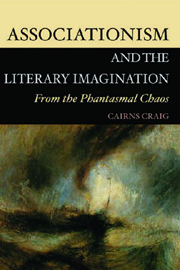Book contents
- Frontmatter
- Contents
- Acknowledgments
- Abbreviations
- Introduction: A Chain of Associations
- 1 ‘Kant has not answered Hume’: Hume, Coleridge and the Romantic Imagination
- 2 Signs of Mind and the Return of the Native: Wordsworth to Yeats
- 3 Strange Attractors and the Conversible World: Hume, Sterne, Dickens
- 4 The Mythic Method and the Foundations of Modern Literary Criticism
- 5 Chaos and Conversation: Pater, Joyce, Woolf
- 6 The Lyrical Epic and the Singularity of Literature
- Bibliography
- Index
4 - The Mythic Method and the Foundations of Modern Literary Criticism
Published online by Cambridge University Press: 12 September 2012
- Frontmatter
- Contents
- Acknowledgments
- Abbreviations
- Introduction: A Chain of Associations
- 1 ‘Kant has not answered Hume’: Hume, Coleridge and the Romantic Imagination
- 2 Signs of Mind and the Return of the Native: Wordsworth to Yeats
- 3 Strange Attractors and the Conversible World: Hume, Sterne, Dickens
- 4 The Mythic Method and the Foundations of Modern Literary Criticism
- 5 Chaos and Conversation: Pater, Joyce, Woolf
- 6 The Lyrical Epic and the Singularity of Literature
- Bibliography
- Index
Summary
In his ‘Introduction’ to the Ninth Edition of the Encyclopaedia Britannica (which was to become an intellectual landmark of Victorian culture), Professor T. S. Baynes of St Andrews University suggested that its aim was to assemble ‘the available facts of human history, collected over the widest areas’ and to present them, ‘carefully co-ordinated and grouped together, in the hope of ultimately evolving the laws of progress, moral and material, which underlie them, and which, when evolved, will help to connect and interpret the whole onward movement of the race’. The Ninth Edition saw its territory not as a series of separate branches of knowledge but as an as yet unrealised totality in which all disciplines would be contributors to an evolutionary account of human history. To this endeavour, the new science of anthropology was central:
Many branches of mental philosophy, again, such as Ethics, Psychology and Aesthetics, while supplying important elements to the new science [of Anthropology] are at the same time largely interested in its results and all may be regarded as subservient to the wider problems raised by the philosophy of history.
Anthropology, as the study of how human beings evolved from the savage to the civilised, represents the foundation on which all other disciplines are built and the location to which they return. One of the most striking applications of this hypothesis in the early volumes of the Ninth Edition was William Robertson Smith's discussion of the anthropological evidence of the Old Testament.
- Type
- Chapter
- Information
- Associationism and the Literary ImaginationFrom the Phantasmal Chaos, pp. 181 - 238Publisher: Edinburgh University PressPrint publication year: 2007



